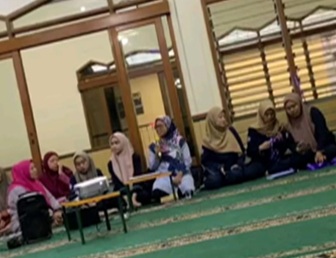Implementasi Edukasi Kesehatan untuk Meningkatkan Self Efficacy dan Motivasi pada Pasien Hipertensi Implementation of Health Education to Improve Self-Efficacy and Motivation in Hypertension Patients
Main Article Content
Abstract
Hypertension is a significant contributor to the leading cause of death in Bandung City. This chronic condition requires long-term management by individuals to prevent potentially fatal complications. Therefore, it is crucial for individuals with hypertension to actively engage in the management of their condition, which demands high levels of motivation and self-efficacy. In this context, health education is pivotal in empowering patients to perform self-care effectively. This community service (Pengmas) activity was conducted within the jurisdiction of the Cijagra Lama Health Center in Bandung City, and integrated into the Ners professional student program, on May 19, 2024. The community service involved providing educational materials on hypertension and its management. The educational approach included presentations using PowerPoint slides and the distribution of informational leaflets. Results from pre- and post-test with the Wilcoxon test demonstrated a significant improvement in both self-efficacy and motivation among the 39 participants in the community service program, concerning the management of hypertension. This initiative is expected to enhance participants' ability to manage their condition effectively, promoting better control over their health.
Downloads
Article Details

This work is licensed under a Creative Commons Attribution-ShareAlike 4.0 International License.
Authors who publish with this journal agree to the following terms:
- Any article on the copyright is retained by the author(s).
- Author grant the journal, right of first publication with the work simultaneously licensed under a Creative Commons Attribution License that allows others to share work with acknowledgment of the work authors and initial publications in this journal.
- Authors are able to enter into a separate, additional contractual arrangements for non-exclusive distribution of published articles of work (eg, post-institutional repository) or publish it in a book, with acknowledgment of its initial publication in this journal.
- Authors are permitted and encouraged to post their work online (e.g., in institutional repositories or on their websites) prior to and during the submission process, as can lead to productive exchanges, as well as earlier and greater citation of published work.
- The article and any associated published material is distributed under the Creative Commons Attribution-ShareAlike 4.0 International License
References
Debela, D. B., Dhaba, B., Shumi, G., Abagero, A., Gudina, G., Ayana, Y., Addissie, A., Deressa, W., & Scuteri, A. (2023). Effect of an Educational Intervention on Lifestyle Modification of Patients With Hypertension at Bishoftu General Hospital, Ethiopia, 2021. Preventing Chronic Disease, 20(20), 1–6. https://doi.org/10.5888/pcd20.220235
Dewi, I. P. (2017). Volume 4 | Nomor 2 | Desember 2017. Jurnal Keperawatan Aisyiyah, 4(6), 33–39. https://doi.org/10.33867/jka.v5i1.89
Dinas Kesehatan Kota Bandung. (2020). Profil Dinas Kesehatan Kota Bandung Tahun 2019. 287. www.dinkes.bandung.go.id
Dinas Kesehatan Provinsi Jawa Barat. (2017). Profil Kesehatan Dinas Kesehatan Provinsi Jawa Barat 2017. Diskes Jabarprov, 52.https://ppid-diskes.jabarprov.go.id/informasipublik/dipdetail/03setiap/cVdONmxNdGlwcEowL3loMUY5UkUzZz09
Hu, H., Li, G., & Arao, T. (2013). Validation of a Chinese Version of the Self-Efficacy for Managing Chronic Disease 6-Item Scale in Patients with Hypertension in Primary Care. ISRN Public Health, 2013, 1–6. https://doi.org/10.1155/2013/298986
Mohebi, S., Parham, M., Sharifirad, G., & Gharlipour, Z. (2018). Social Support and Self ‑ Care Behavior Study. January, 1–6. https://doi.org/10.4103/jehp.jehp
Neminqani, D. M., El-shereef, E. A. A., & Thubiany, M. M. A. L. (2015). Hypertensive Patients: Self-Care Management Practices in Al-Taif, KSA. International Journal of Science and Research (IJSR), 4(12), 1705–1714. https://doi.org/10.21275/v4i12.nov152310
Olin, B. R. (2015). Hypertension: The Silent Killer: Updated JNC8 Guideline Recommendations Associate Clinical Professor of Pharmacy Practice, Drug Information and Learning Resource Center. https://cdn.ymaws.com/www.aparx.org/resource/resmgr/CEs/CE_Hypertension_The_Silent_K.pdf
Pardosi, S., Sahran, & Permata Sari, F. (2019). The effect of hypertension education on self management in elderly in the working area of puskesmas lingkar barat kota bengkulu 2018. (Icihc 2018) 14, 58–61. https://doi.org/10.2991/icihc-18.2019.15
Peltzer, K., & Pengpid, S. (2018). The Prevalence and Social Determinants of Hypertension among Adults in Indonesia: A Cross-Sectional Population-Based National Survey. International Journal of Hypertension, 2018. https://doi.org/10.1155/2018/5610725
Rahmad, A. (2017). Alasan Peneliti Menggunakan Analisis Statistik Wilcoxon ( Non Parametrik ).
RISKESDAS. (2018). Laporan Nasional RISKESDAS 2018. https://repository.badankebijakan.kemkes.go.id/id/eprint/3514/1/Laporan%20Riskesdas%202018%20Nasional.pdf
Salami, S. (2021). Self care management. Universitas ’Aisyiyah Bandung, 8(1), 87–99. https://doi.org/10.33867/jka.v8i1.261
Salami, S., Choo, S. S., Said, F. M., & Wilandika, A. (2023). Psychometric Properties of The Indonesian Version of Hypertension Self Care Profile. Malaysian Journal of Medicine and Health Sciences, 19(4), 231–236. https://doi.org/10.47836/MJMHS.19.4.34
Salami, S., & Wilandika, A. (2018). Volume 5 | Nomor 2 | Desember 2018. Jurnal Keperawatan, 5(6), 99–106. https://scholar.google.co.id/citations?user=FPUjHVYAAAAJ&hl=id#d=gs_md_cita-d&u=%2Fcitations%3Fview_op%3Dview_citation%26hl%3Did%26user%3DFPUjHVYAAAAJ%26c
Suling, C., Gaghauna, E., & Santoso, B. (2023). Motivasi Pasien Hipertensi Berhubungan Dengan Kepatuhan Minum Obat. Jurnal Keperawatan, 16(1), 383–396. https://doi.org/10.32583/keperawatan.v15i3.1081
Tan, P. P. S., Sandhu, R. S., Zain, S. M., Hall, D., Tan, N. C., Lim, H. M., Daud, F., & Pung, Y. F. (2022). Health motivations and perceived barriers are determinants of self-care behaviour for the prevention of hypertension in a Malaysian community. PloS One, 17(12), e0278761. https://doi.org/10.1371/journal.pone.0278761
Utari, R., Sari, N., & Sari, F. E. (2021). Efektivitas Pendidikan Kesehatan perhadap Motivasi Diit Hipertensi Pada Lansia Hipertensi di Posyandu Lansia Desa Makarti Tulang Bawang Barat Tahun 2020. Jurnal Dunia Kesmas, 10(1), 136–144. https://doi.org/10.33024/jdk.v10i1.3550
Warren-Findlow, J., Seymour, R. B., & Huber, L. R. B. (2012). The association between self-efficacy and hypertension self-care activities among African American adults. Journal of Community Health, 37(1), 15–24. https://doi.org/10.1007/s10900-011-9410-6
World Health Organization [WHO]. (2021). WHO Guideline on self-care interventions for health and well-being. https://www.who.int/publications/i/item/9789240052192
Yildiz, E., & Erci, B. (2016). Effects of self-care model on blood pressure levels and self-care agency in patients with hypertension. International Journal of Health Sciences, 4(1),(ISSN: 2372-5060), 42–43. https://doi.org/10.15640/ijhs.v4n1a8
Zinat Motlagh, S. F., Chaman, R., Sadeghi, E., & Ali Eslami, A. (2016). Self-care behaviors and related factors in hypertensive patients. Iranian Red Crescent Medical Journal, 18(6). https://doi.org/10.5812/ircmj.35805
